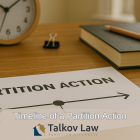Resolve Your Property Dispute Quickly, No Upfront Costs
Owning property with others in Temecula can become complicated when co-owners disagree. Talkov Law is Temecula‘s leading partition law firm, dedicated exclusively to resolving co-ownership disputes with expertise in real estate law, local property regulations, and a proven track record of successful negotiations.
- Zero Partitions Denied
- 500+ Partition Cases Filed
- Most Cases Resolved in Under 7 Months
- No Fees Unless You Win!
Call Now at (951) 888-3300

Your Next Step in Solving a Partition Dispute
Guided by our experienced partition attorneys, you’ll move through each step while we shoulder the legal complexities.
Co-Ownership Conflict? Not Anymore.
Most co-ownership disputes are settled in under 7 months, and you pay no upfront costs.
We’ve assisted hundreds at Talkov Law Partition Attorneys, the only California real estate law firm exclusively dedicated to partition actions.
Request Your Free Consultation Today
Our attorneys will review your property situation at no cost and explain your legal remedies.

Take Control With Legal Action

Walk Away With the Equity You Deserve
What is a Partition Action?
A partition action is the legal remedy that allows the court to force the sale or division of property when co-owners disagree.
Common Scenarios
- Rental property owned by multiple investors
- Land co-owned by extended relatives with conflicting plans
- Shared property where one owner wants cash out, the other does not
In California, any co-owner has an absolute right to partition real property under California Code of Civil Procedure 872.710.

Trusted by Hundreds of Partition Clients
From complex legal battles to life-changing victories, our clients share how Talkov Law helped them find clarity, confidence, and success.
Frequently Asked Questions About Temecula Partition Actions
Uncertain about your right to force a sale, anxious about potential expenses, or curious about timing? This FAQ covers the most common questions. If your concern isn’t answered, a free consultation is only a click away.
📞 Call (877) PARTITION 📞
What happens if the property can't be physically divided in Temecula?
If a property in Temecula cannot be physically divided, the court may order a sale of the property and distribute the proceeds among the co-owners according to their respective interests.
How much does a Partition Action cost in Temecula?
Partition actions in Temecula come with a range of expenses, including attorney fees, court costs, appraisals, and other legal services. On average, these cases cost around $20,000, though simpler cases may cost as little as $5,000, while complex disputes involving high-value properties or uncooperative co-owners can go higher.
What if a co-owner made improvements or paid more in Temecula?
In a California Partition Action, if a co-owner in Temecula has made significant improvements or paid more towards the property, the court may adjust the division of proceeds to compensate that co-owner for their contributions, ensuring a fair distribution based on the enhanced value or additional expenses incurred.
How is the property divided in a Partition Action in Temecula?
In a California Partition Action, including in Temecula, the court may order the property to be physically divided among the co-owners if feasible, or more commonly, it may order the property to be sold and the proceeds distributed among the co-owners according to their ownership interests.

Temecula Real Estate and Legal Data
- In Temecula, the median home value is around $700,000.
- Temecula has an estimated population of 114,761.
- The average rent in Temecula is around $2,500 per month, as of 2024..
At Talkov Law, our Temecula Lawyers have resolved partition disputes in under 7 months with our expert partition strategies.
Why Choose Talkov Law for Your Partition Case?
- Most Experienced: 470+ Partition Cases – More than any other attorneys
- Dedicated Focus: California’s single firm committed solely to partition law
- Proven History: No partition cases denied over 16+ years


Partition Attorneys Serving All of Riverside County
Our attorneys have extensive experience handling partition actions across Riverside County.
Local Expertise in Neighborhoods Like: Murrieta, Wildomar, and Fallbrook. Also Serving Areas in:Murrieta, Hemet, Vista, Oceanside, and Carlsbad.
Your case will likely be heard at the Riverside Superior Court, located at 4050 Main Street, Riverside, CA 92501.


































































































































